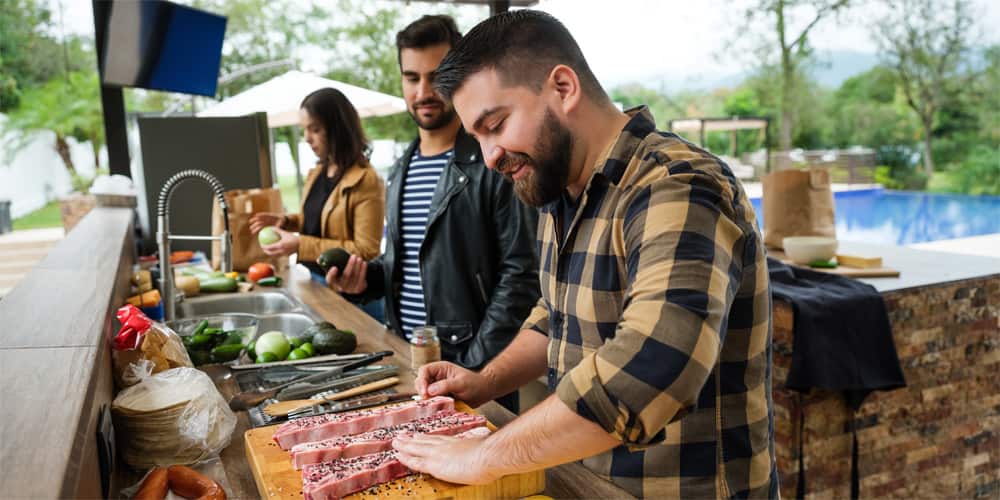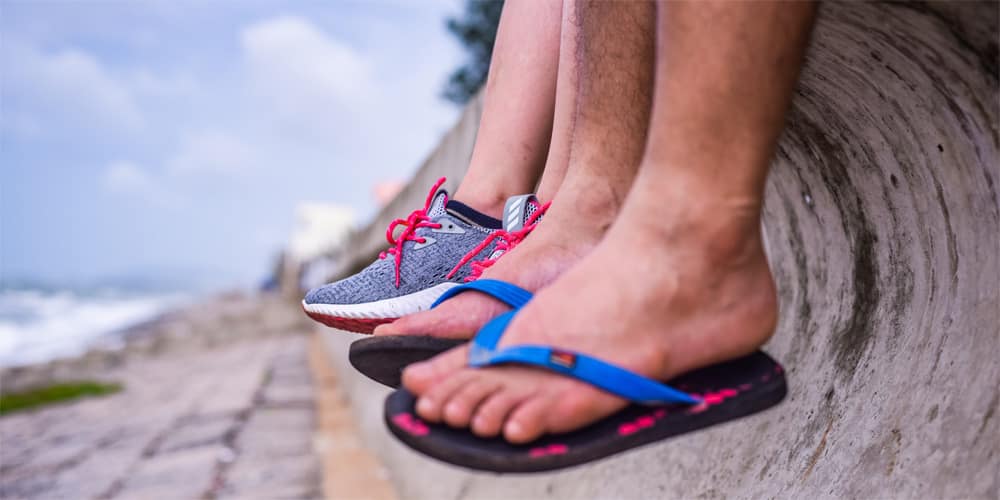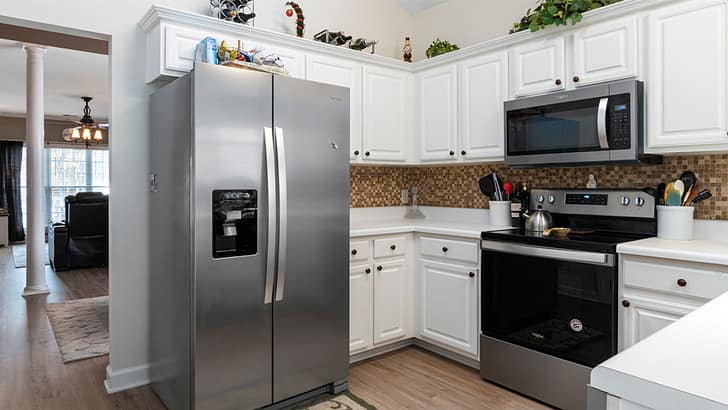I’ve spent more years in the kitchen than I care to reveal. From passively watching my family members to actively assisting them, and eventually taking over my own domestic domain
. Over the years I’ve learned (often the hard way) many tips and tricks regarding kitchen safety. Here’s a list of the top 10 most important tips for avoiding injury and illness in the kitchen.
1. Make Yourself Kitchen Safe

Before anything else, put your hair up or consider wrapping it in a scarf or bandana. Nobody likes finding random hair in their food.
Wash your hands before touching any food. Continue to wash them throughout the cooking process, after handling food (especially meat), opening cans, etc.
Also, place your phone in a baggie or wrap it in some plastic. The average cell phone has 25,000 bacteria per square inch. That’s more than a toilet seat.
2. Limit Distractions
I’ve learned the hard way (more than once), that distraction in the kitchen can lead to disaster. Try to keep the kids and the pets out.
Don’t try to multitask while prepping. This means no phone and no binge watching The Crown. Stay focused on each task. It only takes a second for a knife to slip, a pot to fall, or a dish to drop.
3. Wear Closed Toe Shoes With A Rubber Sole Or Traction

If you follow but one tip on this list, let this be the one. For years, my inner hippie trekked about the kitchen barefoot, until one day I dropped a glass. Luckily, it missed my foot, but I was basically trapped, surrounded by broken glass bits. I had to Indiana Jones my way out of it.
You also want to protect your piggies from anything else that might drop like a knife or a pot. Shoes with traction are always a good idea, because it’s easy to miss some water or oil that may have dropped to the floor. Instead of sauteing garlic, you’ll be wrapping an ankle.
4. Clean As You Go
This is not only an important kitchen safety tip, but a universal life tip. Clean up spills as soon as they happen.
Wash dishes, wipe down surfaces and disinfect them, to get rid of possible contaminants. Don’t leave too many pots, dishes, utensils, etc. lying around, as that increases the chances of accidents occurring.
5. Don’t Rush
I find that my worst cooking is done when I’m running around trying to fit it in around others tasks. I also suffer the most accidents. Knives have slipped while chopping veggies, things have dropped on the floor, and I even forgot that I had pots going on the stove. Cooking is an art, not an athletic event.
6. Know Your Knifes. Respect Your Knives

The importance of proper knife care cannot be stressed enough. Keeping your cutlery sharpened and stored properly can prevent a lot of accidents.
Just as important, is knowing which knives are used for what tasks. For example, a serrated knife should be used for cutting food that is hard outside and soft inside, like bread. Never use a butter knife for anything other than creamy, soft ingredients like soft cheeses, jam, and, of course, butter.
Always cut away your body and keep your eye on the blade. Use a good cutting board. I recommend a bamboo board. It doesn’t slip like glass and it doesn’t collect bacteria like many regular wooden boards. Learning basic knife techniques can go a long way to preventing accidents.
7. Have A Fire Extinguisher And Know How To Use It
Never think it can’t happen to you. Kitchen fires can happen to even the most experienced of chefs. You should always have an extinguisher stored in your kitchen. Make sure to purchase one that is multifunctional. Some do not put out grease fires and can make it worse if used on one.
Read the directions and be prepared to use it as soon as you purchase it. Don’t wait until a fire starts. Should a fire start and you don’t have a fire extinguisher,
DO NOT use water, flour, or towels. These can all cause the fire to spread. Baking soda is the only thing you should pour on a fire.
8. Don’t Leave Food Unattended
The leading cause of home fires is “unattended cooking.” People forget or step out and leave equipment going for extended periods of time. This leads us back to not becoming distracted or rushed.
I’m a bit obsessive in this department. I feel uncomfortable leaving a slow cooker by itself, and that’s the whole point! Always be careful if you need to step away. Keep everything clear of the stove, curtains, oven mitts, cardboard, plastic, etc.
This goes for any other equipment as well. Rice cookers, toaster ovens, and yes, slow cookers. My slow cooker, when in use, is far, far away from everything else.
9. Check/Maintain Your Appliances Regularly
Proper maintenance of your appliances is extremely important when it comes to safety. Make sure wires are not frayed, plugs have not gotten mucky, wet, or rusty.
Make sure there’s no stray crumbs anywhere in the equipment (this includes the microwave) as it can cause an electrical spark. Store all small appliances properly and keep them covered.
10. Make Sure Your Stove/Oven Is Tidy And In Good Working Order

Making sure that your oven is free of debris is important before using it. Even the smallest bits of stray food can cause trouble for you. Often, by the time you realize there’s a problem, you have a kitchen full of smoke or a fire in the oven.
The same thing goes for the stove top. Even a random elbow macaroni can go up and cause unintended flames that can ruin a dinner. Also, make sure that all of the pilot lights are lit and you don’t smell gas.







